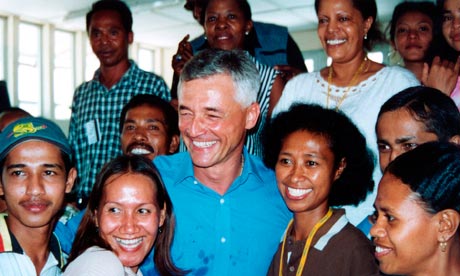
A cross between James Bond and Bobby Kennedy. A man loved and admired by everyone who worked with him. A man so charismatic he was known throughout the world simply by his first name, Sergio. A man whose reputation for getting the job done in difficult situations ultimately got him the one job he didn't want: that of trying to sort out the mess caused by a war he had never supported. Fight to Save the World: Sergio (BBC4) was another minor classic from the Storyville strand, an intimate portrait of the life and death of the Brazilian UN diplomat Sergio Vieira de Mello. Though mainly his death.
The main purpose of this film wasn't just to remind everyone of his achievements in resettling refugees in Cambodia and mediating East Timor's peaceful independence from Indonesia, it was to point a few guilty fingers at those responsible for him dying under a pile of rubble after a truck bomb destroyed the UN headquarters, where Sergio was head of mission, at the Canal Hotel in Baghdad in August 2003.
But it didn't do it in a heavy-handed way; rather it spliced archive footage and contemporary interviews into an unsentimental love bomb of its own. The open displays of affection from those who knew and loved him were powerful testimony to a man who genuinely wanted to make a difference and valued all people and cultures equally. All the more so when they were offset by interviews with an uncomfortable Tony Blair, one of the men who had wanted Sergio to take the Baghdad job as he knew he was the only person in with a chance of putting Iraq back together after the US-UK coalition had screwed it up.
There were inspiring tales of heroism – the two US firefighters who battled through the rubble to try to pull out Sergio and his colleague Gil Loescher: Loescher's legs were amputated without painkillers in situ. He survived, Sergio died. There were also tales of the bizarre – the firefighter who still believes that Sergio's refusal to pray to God was proof of a lack of trust that cost him his life.
Yet what lingered, apart from Sergio's obvious charm, were the tensions that punctuated the film but were deliberately never resolved. The information that there was no love lost between Sergio and Paul Bremer, the US head of administration in Iraq; that Sergio was days away from releasing a report highly critical of the US; that the world's superpower couldn't summon up any lifting gear from elsewhere in Iraq to free the trapped UN workers sooner; and that the security around the UN building was laughably poor – Sergio had asked for it to be that way to prove the UN was not a US puppet and the Americans hadn't demurred. The inference was that Sergio's death was one that had been entirely predicted and could still have been prevented after the bombing.
Two voices were missing, though; his sons. The documentary acknowledged that Sergio had neglected his family in the pursuit of a humanitarian career trouble-shooting the world's hotspots. The world remembers their father as a latter-day saint and hero. I would imagine his sons have rather more ambivalent feelings.
Doctors and nurses tend to get rather stroppy when you describe them as saints, but the ones on view at King's College Hospital in south-east London in 24 Hours in A&E (Channel 4) certainly displayed the patience commonly associated with canonisation. More than half the department's weekend admissions are alcohol-related, and during the course of the film a succession of drunks turned up bleeding and confused in casualty demanding the right both to be patched up and to abuse anyone who tried to help them. There were a few wry asides from the staff – "I'm worried he's going to survive" – but invariably the medics treated the patients with a care and respect they had learned not to expect in return. I don't know how they do it.
Where the film worked best was in developing the backstories of the patients. Some were just teenagers binge drinking, but many were long-term alcoholics with mental-health issues and regular A&E recidivists. These are also the people David Cameron recently suggested should not be entitled to benefits as they had brought their condition on themselves. I'd suggest he spent 24 hours in A&E talking to everyone at King's. Then he can reinvent the Big Society 5.0.
I'd rather assumed Diagnosis Live from the Clinic (Channel 4) must have been prerecorded, but it turns out it really is live. I guess the clue is in the title. If anything, though, the fact it is live makes the show even stranger. What kind of person Skypes a TV doctor for a diagnosis? I'd guess only someone who is a bit pissed or was doing it for a bet. Because what can the doctor say? That it looks like cancer and the patient had better go to A&E. The staff at King's will be thrilled.

